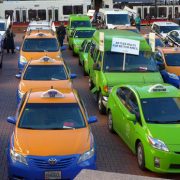Uber: Navigating Employment Laws and Taxi Licensing Laws in Multiple Jurisdictions
Author: Jamie C. Yang, translated into English by Colbert Hung
Uber’s Success and Its Legal Problems
Founded in 2009, Uber has enjoyed a huge success and expanded its operations to 58 countries worldwide by 2015. The Uber APP set out to tackle comfort and inefficiency problems of public transportation in many cities. While taxis are available in many cities, hailing a cab is often left to chance. Customers must merely wait by the roadside for a free taxi to show up, and service quality varies widely. By matching customers and drivers real-time through its algorithm, and monitoring drivers’ timeliness and dictating the route through digital maps and GPS signals, Uber provides answers to these problems.

Taxi Cabs vs Uber by Aaron Parecki is licensed under CC BY 2.0
Uber’s business operation is unconventional. It does not claim to hire any driver or own any vehicle, and anyone with a driver’s license and an available vehicle may sign up as a driver subject to internal screening by Uber. This makes Uber’s operation at odds with employment laws in some jurisdictions and taxi licensing laws in others.
Does Employment Laws Apply?
Uber’s business model relies on paying its workforce of hundreds of thousands of drivers as contractors, sparing it from paying expenses such as health insurance and unemployment benefits. However, the separation of “employee” and “contractor” status is more of a matter of characterization rather than a bright line rule, and there have been instances where authorities have deemed Uber as an employer.
For instance, the Wall Street Journal reported that in August 2015, the California Employment Development Department ruled in a labor dispute that a former driver for Uber acted more like an employee than a contractor. Uber was asked to pay unemployment benefits to the former driver.
Might Uber be characterized as “employing” their drivers in Taiwan? There exist a few large cab companies whose relationship with drivers is similar to that of Uber and how those relationships are characterized may serve as reference points. 55688 Taxi Service, the largest of these companies, leases vehicles to drivers and feed clients to these drivers through APPs and conventional call centers. Drivers working with 55688 Taxi Service have not yet been deemed as employees for labor law purposes, nevertheless, a Taipei District Court had held 55688 Taxi Service to be vicariously liable as an employer for tortious act by one of its drivers.
The isolated Taipei District Court case rested on tort theories and not labor law. Uber drivers work as many hours as they choose to and split fees with Uber, and the control exerted by Uber hardly amounts to that of a regular employer. Therefore, the threat of Uber being considered an “employer” rather than “contractor” for labor law purposes in Taiwan is currently still remote.
Conflict with Taxi Licensing Laws
In Taiwan, business licenses are required to earn fees for chauffeuring services. The licensing requirement has justifiable reasons: safety and fairness of taxation. The safety issue has started to surface in many countries. Alzajeera reported that in October 2015, an Uber driver in Delhi was convicted of raping his passenger.
Mainly for safety and fairness of taxation reasons, gypsy cabs are banned in Taiwan. Still, gypsy cabs are sometimes spotted outside of popular transportation junctures such as airports, train stations and high speed rail stations soliciting passengers and playing cat-and-mouse with the police.
Are Uber drivers that different from gypsy cab drivers? First, the payment systems are different: gypsy cab drivers typically receive cash, while Uber drivers receive wired payment from Uber. Secondly, the marketing channels are different: gypsy cab drivers solicit passengers typically, while Uber drivers appear at addresses designated by the APP. Lastly, there is no prescreening process for gypsy cab drivers and anyone can be one, but Uber reportedly has a standard operating procedure for driver selection.
Nonetheless, these differences hardly set Uber drivers apart from gypsy cab drivers in the eyes of Taiwan Taxi Licensing Laws. Once caught, Uber drivers might be similarly penalized as gypsy cab drivers.
Extensive Readings:




Leave a Reply
Want to join the discussion?Feel free to contribute!